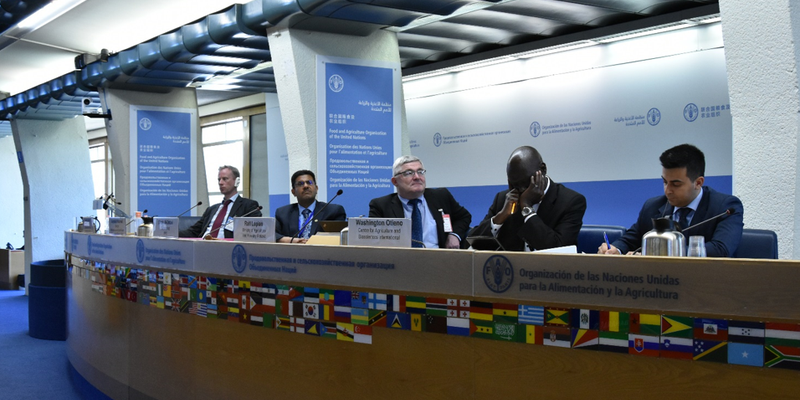CPM-13 Side Session on the 2020 International Year of Plant Health held at FAO HQ
Posted on Fri, 20 Apr 2018, 15:42

A side session on the 2020 International Year of Plant Health (IYPH) was held in the Plenary Hall at the FAO Headquarters in Rome on Thursday 19th April at the margins of the Thirteenth Session of the Commission of Phytosanitary Measures (CPM-13). The session, co-organized by the secretariat of the International Plant Protection Convention (IPPC), was opened by Dr Shoki Al-Dobai, IPPC Integration and Support Team Leader at the presence of over 60 participants. Speakers included Ms Marcella Villarreal, the Director of FAO s Division of Partnerships and South-South Cooperation (DPS); Mr Ralf Lopian, IPPC contact point for Finland and chairperson of the IYPH Steering Committee; Mr Melvin Spreij, Head of the Standards and Trade Development Facility (STDF) Secretariat; Dr Washington Otieno, Plantwise Program Executive at CAB International; and Mr Dennis Johnson, Seed Health Manager for the International Seed Federation (ISF).
Ms Marcella Villarreal spoke of her experiences with previous International Years, including the International Year of Pulses, Family Farming and Quinoa. She emphasised that a successful year should boost awareness, but also impact on policies and uptake, as in the case of the International Year of Quinoa, which increased the production and consumption of the grain. She also highlighted effective awareness raising strategies, such as the use of adverts in popular kids magazine Topolino during the International Year of Pulses.
Mr Ralf Lopian presented the current challenges to Plant Health and related NPPOs and international organizations: scarce resources, decreasing research, less taxonomic expertise and diagnostic resources. In his words: An International Year of Plant Health should ease these challenges and benefit a number of groups, ranging from NPPOs to the general public. He went on to ask what NPPOs, RPPOs and international organizations could do. One way of supporting activities would be to co-organize events.
Mr Melvin Spreij agreed with the previous speakers and highlighted that the IYPH provided an opportunity to increase awareness, mobilize resources (e.g. from GEF), improve public-public collaborations and promote public-private partnerships.
As noted by Mr Ralf Lopian, Dr Washington Otieno mentioned that Plant Health is a low priority area for funding and there is a decreasing exchange of pest information. ICT has useful applications that may be used for Plant Health, such as apps that support real-time diagnostics and pest control.
Mr Dennis Johnson rounded off the talks with a presentation on seed movement. ISF is composed of over 7500 seed companies across 75 countries, and the international movement of seed is essential to the seed industry, where seed can be produced in one country, moved to another for processing, and packaged in yet another country. ISF are committed to delivering quality seed in a timely manner (and this also means being pest free). The ISF should therefore be aligned with the IPPC and its projects and standards, such as the new ePhyto system and ISPM 38 (International movement of seeds). The IYPH will boost ISPM 38 implementation, increase collaboration with NPPOs, increase Plant Health related research and increase funding for NPPOs, he concluded.
Among the next steps agreed to were the development of a Communications plan for 2020, and planning for IYPH activities, workshops and other events.
You may watch the recording at the following link: http://www.fao.org/webcast/home/en/item/4674/icode/

